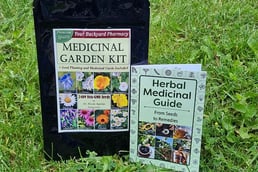Top 5 Benefits of Yarrow
A review of the top 5 health benefits of Yarrow and a look at the best ways to add Yarrow to your routine.
7/30/20243 min read


Yarrow and it’s TOP 5 health benefits
Yarrow (Achillea millefolium) is a perennial herb known for its feathery leaves and clusters of small, white, or sometimes pink flowers. It's a versatile plant, both in the wild and as a cultivated garden herb, prized for its medicinal properties and historical uses.
Finding Yarrow in the Wild and Growing It in Your Garden
In the Wild:
Yarrow is native to temperate regions of the Northern Hemisphere and can often be found in meadows, grasslands, and along roadsides. It's a hardy plant, capable of thriving in poor soil and a variety of conditions. Its distinctive fern-like leaves and flat-topped clusters of flowers make it easy to identify.
In Your Garden:
Yarrow is an excellent addition to gardens for its low maintenance and attractiveness to pollinators. It prefers full sun and well-drained soil but can tolerate partial shade and a range of soil types. Yarrow can be propagated from seeds, cuttings, or root division. Once established, it requires minimal watering and care, making it ideal for low-water landscapes or xeriscaping.
Top 5 Health Benefits of Yarrow
Wound Healing
Yarrow has been traditionally used for its wound-healing properties. It contains compounds like flavonoids and tannins that help stop bleeding, reduce inflammation, and promote tissue repair. The key components include:Achilleine: Known for its hemostatic (blood-clotting) properties.
Flavonoids: Contribute to anti-inflammatory and antioxidant effects.
Digestive Health
Yarrow has been used to soothe digestive issues, such as indigestion, bloating, and cramps. It stimulates digestion and helps relieve gastrointestinal discomfort.Bitter compounds: Stimulate digestive secretions and improve appetite.
Azulene: Known for its anti-inflammatory and soothing effects on the digestive tract.
Menstrual Relief
Yarrow is often used to ease menstrual discomfort, including cramps and heavy bleeding. It acts as an emmenagogue, helping to regulate menstrual cycles and reduce symptoms of PMS.Thujone: A compound that helps stimulate menstrual flow and relieve pain.
Phytoestrogens: Plant-based compounds that mimic estrogen and can help balance hormones.
Anti-Inflammatory Properties
Yarrow's anti-inflammatory properties make it useful for treating a variety of inflammatory conditions, such as arthritis, skin irritations, and respiratory issues.Chamazulene: A compound with potent anti-inflammatory effects.
Sesquiterpene lactones: Contribute to the plant's overall anti-inflammatory action.
Immune Support
Yarrow has been used to boost the immune system and ward off infections. It has antimicrobial properties that help fight bacteria and viruses.Volatile oils: Including camphor and eucalyptol, which have antimicrobial properties.
Phenolic acids: Known for their antioxidant and immune-boosting effects.
How to Use Yarrow for Health Benefits
Tea
Yarrow tea is a common way to consume the herb. To make it, steep 1-2 teaspoons of dried yarrow flowers and leaves in hot water for 10-15 minutes. This tea can be used to relieve digestive issues, menstrual discomfort, and colds.Tincture
Yarrow tincture is a concentrated liquid extract of the plant. It can be taken in small doses (usually a few drops to a teaspoon) to treat a variety of ailments, including inflammation, fever, and digestive problems.Poultice
For wounds and skin issues, a yarrow poultice can be applied directly to the affected area. Crush fresh leaves and flowers and apply them to the skin, or use a cloth soaked in yarrow tea as a compress.Infused Oil
Yarrow-infused oil can be used topically for skin conditions, muscle aches, and joint pain. To make it, infuse dried yarrow in a carrier oil (like olive or almond oil) for several weeks, then strain and use as needed.Capsules
Yarrow can also be found in capsule form, providing a convenient way to consume the herb, especially for immune support and menstrual regulation.
Safety and Precautions
While yarrow is generally considered safe for most people, some may experience allergic reactions, especially those sensitive to plants in the Asteraceae family (such as ragweed). It's also advised that pregnant or breastfeeding women consult with a healthcare provider before using yarrow, as it can stimulate uterine contractions. Additionally, due to its blood-thinning properties, those taking anticoagulants should use caution.


